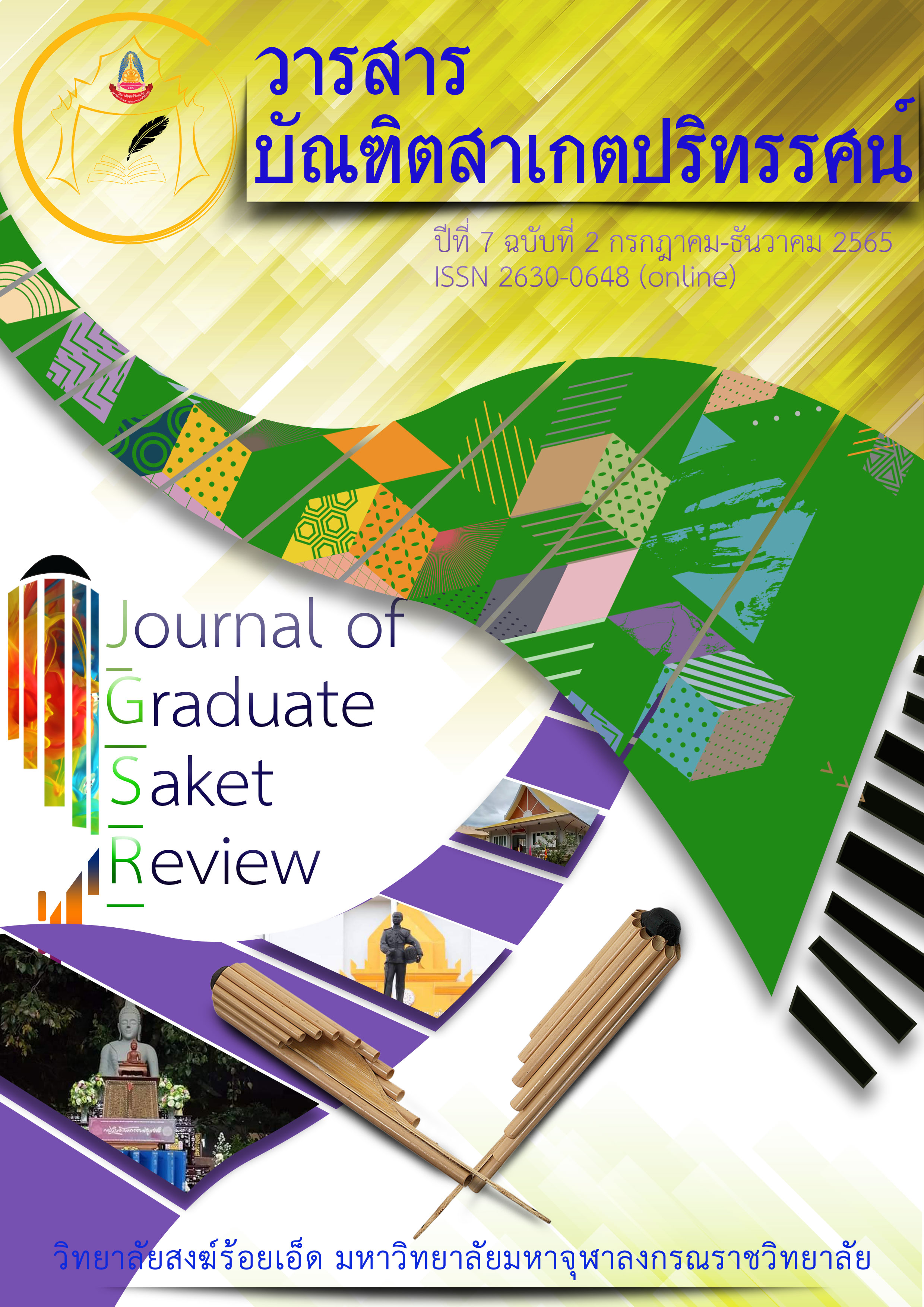แนวทางการส่งเสริมการบริหารงานวิชาการตามหลักภาวนา 4 ของผู้บริหารโรงเรียนสังกัดสำนักงานเขตพื้นที่การศึกษาประถมศึกษาเลย เขต 2
Main Article Content
บทคัดย่อ
การวิจัยเรื่องนี้ มีวัตถุประสงค์ 1) เพื่อศึกษาสภาพการบริหารงานวิชาการของผู้บริหารโรงเรียน 2) เพื่อศึกษาการบริหารงานวิชาการตามหลักภาวนา 4 ของผู้บริหารโรงเรียน และ 3) เพื่อเสนอแนวทางการส่งเสริมการบริหารงานวิชาการตามหลักภาวนา 4 ของผู้บริหารโรงเรียนสังกัดสำนักงานเขตพื้นที่การศึกษาประถมศึกษาเลย เขต 2 กลุ่มตัวอย่างที่ใช้ในการวิจัย จำนวน 320 คน จากประชากรทั้งหมด 1,845 คน สถิติที่ใช้วิเคราะห์ข้อมูล ได้แก่ ค่าความถี่ ค่าร้อยละ ค่าเฉลี่ย และส่วนเบี่ยงเบนมาตรฐาน ผลการวิจัยพบว่า 1) การบริหารงานวิชาการของผู้บริหารโรงเรียนสังกัดสำนักงานเขตพื้นที่การศึกษาประถมศึกษาเลย เขต 2 โดยภาพรวมอยู่ในระดับมาก โดยเรียงลำดับคะแนนเฉลี่ยแต่ละด้านจากมากไปหาน้อย ได้แก่ ด้านการพัฒนากระบวนการเรียนรู้ ด้านการพัฒนาสื่อ นวัตกรรมและเทคโนโลยีทางการศึกษา ด้านการวัดผลประเมินผลการเรียน ด้านการนิเทศการศึกษา และด้านการพัฒนาหลักสูตรสถานศึกษา ตามลำดับ 2) การบริหารงานวิชาการตามหลักภาวนา 4 ของผู้บริหารโรงเรียนสังกัดสำนักงานเขตพื้นที่การศึกษาประถมศึกษาเลย เขต 2 โดยภาพรวมอยู่ในระดับมาก โดยเรียงลำดับคะแนนเฉลี่ยแต่ละด้านจากมากไปหาน้อย ได้แก่ ด้านจิตภาวนา ด้านปัญญาภาวนา ด้านกายภาวนา และด้านศีลภาวนา ตามลำดับ 3) แนวทางการส่งเสริมการบริหารงานวิชาการตามหลักภาวนา 4 ของผู้บริหารโรงเรียนสังกัดสำนักงานเขตพื้นที่การศึกษาประถมศึกษาเลย เขต 2 ส่งเสริมให้บุคลากรในองค์กรต้องพัฒนาบุคลิกภาพที่ดีทั้งการเดิน การนั่ง แต่งกายเหมาะสม ส่งเสริมการออกกำลังกาย และตรวจสุขภาพอย่างสม่ำเสมอ ให้ความสำคัญด้านพัฒนาสุขภาพร่างกายให้แข็งแรง ประพฤติตนเป็นแบบอย่างที่ดี วางตัวเหมาะสม มีความเป็นผู้นำทางวิชาการในการทำงานร่วมกันคนอื่น การมีจิตใจดี มีความเมตตาต่อผู้อยู่ใต้บังคับบัญชา วางตัวผู้ทำงานให้ถูกต้องและเหมาะสมกับงาน ยอมรับความคิดเห็นของผู้อื่น และศึกษาค้นคว้าหาความรู้ พัฒนาตนเองให้ทันต่อสถานการณ์การเปลี่ยนแปลงต่างๆ ให้ทันสมัย
Article Details

อนุญาตภายใต้เงื่อนไข Creative Commons Attribution-NonCommercial-NoDerivatives 4.0 International License.
เนื้อหาและข้อมูลในบทความที่ลงตีพิมพ์ในวารสารบัณฑิตสาเกตปริทรรศน์ ถือเป็นข้อคิดเห็นและความรับผิดชอบของผู้เขียนบทความโดยตรงซึ่งกองบรรณาธิการวารสาร ไม่จำเป็นต้องเห็นด้วย หรือร่วมรับผิดชอบใด ๆบทความ ข้อมูล เนื้อหา รูปภาพ ฯลฯ ที่ได้รับการตีพิมพ์ในวารสารบัณฑิตสาเกตปริทรรศน์ ถือเป็นลิขสิทธิ์ของวารสารบัณฑิตสาเกตปริทรรศน์ หากบุคคลหรือหน่วยงานใดต้องการนำทั้งหมดหรือส่วนหนึ่งส่วนใดไปเผยแพร่ต่อหรือเพื่อกระทำการใด ๆ จะต้องได้รับอนุญาตเป็นลายลักอักษรจากวารสารบัณฑิตสาเกตปริทรรศน์ ก่อนเท่านั้น
เอกสารอ้างอิง
ภาษาไทย
กระทรวงศึกษาธิการ. (2560). แผนพัฒนาการศึกษากระทรวงศึกษาธิการ ฉบับที่ 12 (พ.ศ. 2560 - 2564).กรุงเทพมหานคร: โรงพิมพ์คุรุสภา.
บุญชม ศรีสะอาด. (2554). การวิจัยเบื้องต้น. กรุงเทพมหานคร: บริษัท. สุวีริยาสาส์น จำกัด.
พระเทพเวที (ประยุทธ์ ปยุตฺโต). (2538). พจนานุกรมพุทธศาสน์ฉบับประมวลธรรม. กรุงเทพมหานคร: โรงพิมพ์มหาจุฬาลงกรณราชวิทยาลัย.
พายุ ภูคำวงษ์. (2560). การปรับใช้หลักพุทธจริยธรรมเพื่อพัฒนาผู้บริหารสถานศึกษาขนาดเล็กให้การทำงานมีประสิทธิภาพ. วารสารมนุษยศาสตร์และสังคมศาสตร์ มหาวิทยาลัยราชภัฏอุบลราชธานี.
พระธานี จน̣ทิโก (กลมนอก). (2560). การพัฒนาตนเองตามหลักภาวนา 4 ของเยาวชนตำบลตาขัน อำเภอบ้านค่าย จังหวัดระยอง. วิทยานิพนธ์หลักสูตรปริญญาพุทธศาสตรมหาบัณฑิต สาขาวิชาจิตวิทยา การศึกษา มหาวิทยาลัยมหาจุฬาลงกรณราชวิทยาลัย.
ละมัย บัวขันธ์. (2562). การพัฒนาการเรียนรู้ตามหลักภาวนา 4 เพื่อส่งเสริมความเป็นพลเมืองที่ดี ตามหลักประชาธิปไตยของนักเรียนชั้นมัธยมศึกษาปีที่ 4 โรงเรียนหนองแวงวิทยา จังหวัดสกลนคร. วิทยานิพนธ์หลักสูตรปริญญาพุทธศาสตรมหาบัณฑิต มหาวิทยาลัยมหาจุฬาลงกรณราชวิทยาลัย.
สำนักเลขาธิการการศึกษา กระทรวงศึกษาธิการ. (2560). แผนการศึกษาแห่งชาติ พ.ศ.2560-2564. กรุงเทพมหานคร: โรงพิมพ์ บริษัท พริกหวานกราฟฟิค จำกัด.
อุทัย บุญประเสริฐ.(2555). การวางแผนและจัดระบบแผนงานในโรงเรียน. กรุงเทพมหานคร: โรง พิมพ์เอส ดีเพรส.
ภาษาอังกฤษ
Ministry of Education. (2017). Education Development Plan, Ministry of Education, Vol. 12 (2017 - 2021). (Page 10-64). Bangkok: Teachers Council of Thailand Printing House.
Boonchom Srisaard. (2011). Preliminary research. Bangkok: Suwiriyasan Company Limited.
Phra Thep Vethi (Prayut Payutto). (1995). Buddhist Dictionary. Bangkok: MahaChulalongkorn
rajavidyalaya Printing Press.
Phayu Phukhamwong. (2017). The application of Buddhist ethics to develop administrators of small educational institutions. Work efficiently. Journal of Humanities and Social Sciences Ubon Ratchathani Rajabhat University.
Phra Thani Jaṇtiko (Klomnok). (2017). Self-development according to the 4 principles of prayer of youths in Ta Khan sub-district, Ban Khai District, Rayong Province. Master’s Degree Program Thesis Department of Educational Psychology, Mahachulalongkornrajavidyalaya University.
Lamai Buakhan. (2019). Development of learning according to the 4th prayer principle to
promote good citizenship according to democratic principles of Mathayomsuksa 4 students at Nong Waeng Wittaya School. Sakon Nakhon Province. Master’s Degree Program Thesis Mahachulalongkornrajavidyalaya University.
Uthai Boonprasert.(2012). Planning and organization of school plans. Bangkok: S Depress Printing House.
Krejcie, R. V. & Morgan. (1970). D. W. Determining Sample Size for Research Activities.
Educational and Psychological Measurement.


